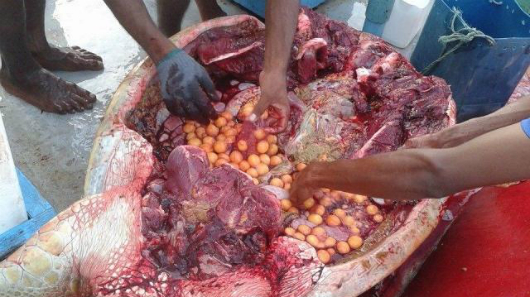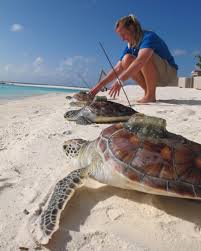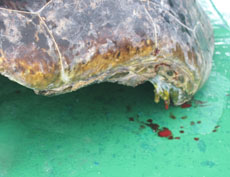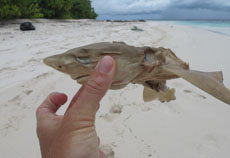Warning: This article contains graphic images.
Local environmental NGOs Ecocare and Bluepeace have condemned images circulating on social media showing a turtle being cut in half for its eggs and meat.
Both the Environmental Protection Agency (EPA) and police are now investigating the pictures.
Ecocare has demanded “immediate action from relevant authorities to stop such atrocities against protected marine species in the country”, in a statement which also said the NGO was “outraged by the lack of adequate enforcement measures in place”.
The pictures which were shared on Facebook show a group of people cutting open an adult sea turtle and extracting its eggs and meat. Local media outlet Sun Online has reported that the pictures were taken on the island of Maalhos in Alif Alif Atoll.
Maalhos Island Council has expressed concern over the incident but has said it was not aware that the pictures originated from the island.
Sun reported council Vice President Ahmed Sameeh as saying that it was common for islanders to hunt turtles and that the council has repeatedly requested citizens to stop.
Bluepeace Executive Director Rilwan Ali told Minivan News that the main obstruction to preventing such instances was poor institutional coordination between the Ministry of Fisheries and Agriculture and the EPA.
“The biggest problem is that turtle conservation comes under the fisheries law which is implemented by the fisheries ministry. The ministry has to share its resources with the EPA so that these kinds of events can be prevented,” said Rilwan.
Speaking on behalf the EPA, Director General Ibrahim Naeem said that these kinds of events could have a negative impact on the tourism of the country as well as long term effects on the economy, while highlighting the need for stricter punishments for such environmental crimes.
According to the fisheries regulations, the “catching, fishing, collecting or killing” of sea turtles is illegal throughout the country. The collection of sea turtles and eggs is also illegal, but only in 14 of the country’s 1,192 islands.
The current moratorium is set to last until 2016 thoug reports of turtle slaughter persist. Earlier this year, one source estimated that up to 180 turtles were killed from a single island in Shaviyani Atoll in 2013.
“There is a well-known nesting island and every night a group is going and hunting the turtles. It is so obvious, every day since January one or two are killed,” said the informed source. “They wait for them to nest on the island, or go snorkeling to hunt them.”
While speaking to Minivan News in April this year, Sam Hope – Marine Discovery Centre Manager at Four Seasons Kuda Huraa – said that the biggest threat to turtles is egg collection and trade.
Meanwhile, turtle conservation expert Dr Agnese Mancini has reported a decline in the population of the majority of turtle species found in the Maldives.
Related to this story
Against the current – Turtle conservation in the Maldives
Widespread ‘secret’ slaughter of endangered sea turtles despite ban; “very tasty” say killers



